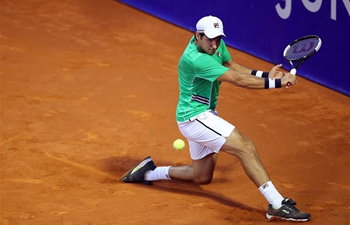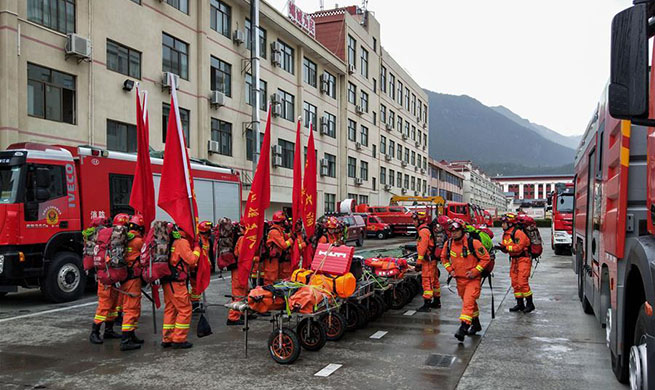WARSAW, July 20 (Xinhua) -- The European Union (EU) has asked member countries to recycle 50 percent of municipal waste by 2020. While Poland has made some progress towards this goal, there are fears it may not reach it.
According to Eurostat, Poland recycled 33.8 percent of municipal waste in 2017, compared to the average of 46.4 across the bloc. While Poland performed better than some of the eastern European and Mediterranean countries, in late 2018, the European Commission warned Poland was one of 14 EU countries at risk of not meeting the 2020 recycling targets.
Poland's Supreme Audit Office announced last year that almost all the localities it controlled were unlikely to meet the 2020 target.
And unlike most western European countries, which have decades of experience with recycling, Poland is relatively new at this and has much ground to cover in a short span of time.
ABSENCE OF COHERENT NATIONWIDE SYSTEM
The main problem with Poland's efforts to do better at recycling over the last years, according to experts, has been the absence of a coherent countrywide system that citizens could be educated about and companies could get used to.
Until 2017, each locality in Poland was free to organize its own recycling system, which in practice meant that each place had a different container system and recycled a different range of materials.
Because the old system was confusing and inefficient, Poles across the country are currently being introduced to a unified system implemented across all of Europe: recycling will be done into five categories -- paper, glass, metal, plastics and packaging, and compost and mixed.
"Having a coherent system across the country, with the same colors of containers, makes it possible to have a nationwide information campaign to educate people about recycling -- and this is very important," Slawomir Brzozek from Poland-based Our Earth Foundation told Xinhua.
Another major debate happening in Poland and Europe at the moment concerns the responsibility of producers for the waste they generate, especially via packaging.
For years, Polish companies have been made responsible to ensure that part of the waste they cause is recycled, but the system was not working. Companies routinely subcontracted this function to so-called "recovery firms" which were tasked with ensuring the recycling target was met.
"Some of these firms did not help create a system of collecting and transforming the waste. Instead, they saw their role as helping companies meet their legal goals as cheaply as possible and make a profit while they were at it," explained Brzozek.
"Now we're discussing in Poland whether this kind of firms are needed at all. There is an interesting proposal to limit their number and transform them -- so they not only play a role in waste collection, but also supervise the matching of recycling companies who provide secondary materials with producers who could use them," said Brzozek.
MORE RESPONSIBILITY FOR COMPANIES
As part of the EU's Circular Economy Package, adopted in 2018 and to be implemented by member states over the following two years, the responsibility of producers for their products will be extended, which means companies will have to bear more of the burden of managing their products and their packaging after they've been used by consumers. This works as an incentive for companies to take environmental considerations into account when designing packaging and products and should reduce recycling costs for other actors like municipalities.
Making sure that the collected waste is transformed and then actually bought by companies which could use it to produce goods is a major challenge in Poland, said Brzozek, noting this market is currently broken. The producers themselves should play a bigger role in this, if the circular economy is to work.
On top of that, to make it worthwhile for companies to buy recovered materials, large quantities have to be available -- supply should be guaranteed. In the case of Poland, according to Brzozek, such large supplies were usually not certain.
"We discovered in Poland that a waste economy organised on only liberal economic principles doesn't work effectively enough. In Poland, the unseen hand of the market has caused not high enough levels of collecting and recycling, but very visible fires," Brzozek told Xinhua.
He's referring to numerous fires happening over the last years either at landfills or at deposits of recycled materials -- some thought to be accidental, others intentional. Starting a fire can be motivated by the need to make more space for new materials when the company has not been able to sell the existing ones.
CALL FOR FULLY FUNCTIONAL SYSTEM
In 2018, the Polish government adopted two pieces of legislation that are meant to contain the so-called "junk mafia" thought to be behind the intentional fires.
Monika Bieniek from the Polish Recycling Association, representing recycling companies, said the new laws bring many new requirements on companies, including the obligation to install video monitoring and fire management systems, more checks by authorities and the need to pay financial deposits to prevent abandoning waste.
One of the biggest concerns is that the new legislation reduces the length of time a recycling company can deposit the waste on its premises, which prevents companies from purchasing larger volumes at lower prices when available on the market, argued Bieniek.
"Unfortunately for recycling companies, the situation is difficult and does not favour the development of the companies -- instead, it will lead to producers turning away from recovered to new raw materials, which will not favour the development of a circular economy in Poland," Bieniek told Xinhua.
According to the Polish Recycling Association, because of the current legal changes, as much as a quarter of producers will resign from the use of secondary raw materials in the following years.
Unlike some western European countries, whose recycling market is almost saturated, Poland has made fast progress in the last years. Nevertheless, to meet the ambitious goals the EU has set for member states, building a fully functional waste management system is key, argued analysts.
"What is problematic in Poland is the inconsistency when it comes to waste management. We often reconsider things we introduced, or try to work out perfect things at once," said Brzozek.
"What we really need now is to just implement what has been planned. We need a clear system of collection and to create a law on Extended Responsibility of Producers. An active and appropriate role of the state is key in this process," the expert added.













